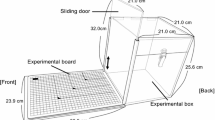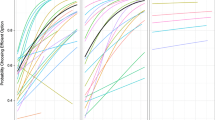Abstract
Several studies have attempted to reveal the evolutionary mechanisms of physical causal understanding in non-human animals by investigating their tool-use behavior. Rats are one of the most commonly used species in experiments in many fields, including neuroscience and physiological psychology, but behavioral tasks for investigating the mechanisms in rodents have not yet been established. The present study implemented a novel training paradigm: a rake-shaped tool was presented in the experimental apparatus without a reward. If rats manipulated the rake laterally over specific distances, the experimenter retrieved the rake and offered the reward by hand. The rats never obtained food directly with the tool during training, and the tool never touched the reward. In the test, the rake was placed at the center of the apparatus, and the reward was placed on either the left or right side of the rake. The rats had no prior experience of obtaining the reward with the tool before the test, and they could not use this simple strategy to manipulate the rake in the direction of the reward during the test. One of eight rats could manipulate the rake according to the position of the reward. The present study offers a tool-use task to reveal the evolutionary mechanisms of physical causal understanding.




Similar content being viewed by others
Data Availability
The videos of this study are available on OSF at https://osf.io/tv2s8/?view_only=92e17a678347412c863f20fd66c1b844.
References
Benjamini, Y., & Hochberg, Y. (1995). Controlling the false discovery rate: A practical and powerful approach to multiple testing. Journal of the Royal Statistical Society: Series B (Methodological), 57(1), 289–300. https://doi.org/10.1111/j.2517-6161.1995.tb02031.x.
Bentley-Condit, V. K., & Smith, E. O. (2010). Animal tool use: Current definitions and an updated comprehensive catalog. Behaviour, 147(2), 185–221. https://doi.org/10.1163/000579509X12512865686555.
Blaisdell, A. P., Sawa, K., Leising, K. J., & Waldmann, M. R. (2006). Causal reasoning in rats. Science, 311(5763), 1020–1022. https://doi.org/10.1126/science.1121872.
Connolly, K., & Dalgleish, M. (1989). The emergence of a tool-using skill in infancy. Developmental Psychology, 25(6), 894–912. https://doi.org/10.1037/0012-1649.25.6.894.
Cummins-Sebree, S. E., & Fragaszy, D. M. (2005). Choosing and using tools: Capuchins (Cebus apella) use a different metric than tamarins (Saguinus oedipus). Journal of Comparative Psychology, 119(2), 210–219. https://doi.org/10.1037/0735-7036.119.2.210.
Fragaszy, D. M., Barton, S. A., Keo, S., Patel, R., Izar, P., Visalberghi, E., & Haslam, M. (2020). Adult and juvenile bearded capuchin monkeys handle stone hammers differently during nut-cracking. American Journal of Primatology, 82, e23156. https://doi.org/10.1002/ajp.23156.
Fujita, K., Kuroshima, H., & Asai, S. (2003). How do tufted capuchin monkeys (Cebus apella) understand causality involved in tool use? Journal of Experimental Psychology: Animal Behavior Processes, 29(3), 233–242. https://doi.org/10.1037/0097-7403.29.3.233.
GOV.UK. Home Office. (2016). Annual statistics of scientific procedures on living animals Great Britain, 2016. Retrieved from: https://assets.publishing.service.gov.uk/government/uploads/system/uploads/attachment_data/file/627284/annual-statistics-scientific-procedures-living-animals-2016.pdf .
Haslam, M. (2013). ‘Captivity bias’ in animal tool use and its implications for the evolution of hominin technology. Philosophical Transactions of the Royal Society B: Biological Sciences, 368(1630), 20120421. https://doi.org/10.1098/rstb.2012.0421.
Hohenberger, A., Elsabbagh, M., Serres, J., de Schoenen, S., Karmiloff-Smith, A., & Aschersleben, G. (2012). Understanding goal-directed human actions and physical causality: The role of mother-infant interaction. Infant Behavior and Development, 35(4), 898–911. https://doi.org/10.1016/j.infbeh.2012.09.005.
Khan, A. G., Sarangi, M., & Bhalla, U. S. (2012). Rats track odour trails accurately using a multi-layered strategy with near-optimal sampling. Nature Communications, 3(1), 703. https://doi.org/10.1038/ncomms1712.
King, J. E., & Witt, E. D. (1966). The learning of patterned strings problems by rock squirrels. Psychonomic Science, 4(9), 319–320. https://doi.org/10.3758/BF03342316.
Kumazawa-Manita, N., Hama, H., Miyawaki, A., & Iriki, A. (2013). Tool use specific adult neurogenesis and synaptogenesis in rodents (Octodon degus) hippocampus. PLoS One, 8(3), e58649. https://doi.org/10.1371/journal.pone.0058649.
Mazur, J. E. (2016). Learning and behavior (8th ed.). New York: Routledge.
Nagano, A. (2019a). Development of a control task for clarifying the neural mechanisms underlying tool-use behavior in rats (Rattus norvegicus). MethodsX, 6, 2845–2854. https://doi.org/10.1016/j.mex.2019.11.022.
Nagano, A. (2019b). Rats’ (Rattus norvegicus) tool manipulation ability exceeds simple patterned behavior. PLoS One, 14(12), e0226569. https://doi.org/10.1371/journal.pone.0226569.
Nagano, A., & Aoyama, K. (2017a). Tool-use by rats (Rattus norvegicus): Tool-choice based on tool features. Animal Cognition, 20(2), 199–213. https://doi.org/10.1007/s10071-016-1039-5.
Nagano, A., & Aoyama, K. (2017b). Tool manipulation by rats (Rattus norvegicus) according to the position of food. Scientific Reports, 7(1), 5960. https://doi.org/10.1038/s41598-017-06308-7.
Norton, S., Culver, B., & Mullenix, P. (1975). Development of nocturnal behavior in albino rats. Behavioral Biology, 15(3), 317–331. https://doi.org/10.1016/S0091-6773(75)91717-4.
Okanoya, K., Tokimoto, N., Kumazawa, N., Hihara, S., & Iriki, A. (2008). Tool-use training in a species of rodent: The emergence of an optimal motor strategy and functional understanding. PLoS One, 3(3), e1860. https://doi.org/10.1371/journal.pone.0001860.
Owings, D. H., & Coss, R. G. (1977). Snake mobbing by California ground squirrels: Adaptive variation and ontogeny. Behaviour, 62(1–2), 50–68. https://doi.org/10.1163/156853977X00045.
Owings, D. H., Coss, R. G., McKernon, D., Rowe, M. P., & Arrowood, P. C. (2001). Snake-directed antipredator behavior of rock squirrels (Spermophilus variegatus): Population differences and snake-species discrimination. Behaviour, 138(5), 575–595. https://doi.org/10.1163/156853901316924485.
Painter, M. C., Russell, R. C., & Jusge, P. G. (2019). Capuchins (Sapajus apella) and squirrel monkeys (Saimiri sciureus) fail to attend to the functional spatial relationship between a tool and a reward. Journal of Comparative Psychology, 133(4), 463–473. https://doi.org/10.1037/com0000179.
Santos, L. R., Pearson, H. M., Spaepen, G. M., Tsao, F., & Hauser, M. D. (2006). Probing the limits of competence: Experiments with two non-tool-using species (Cercopithecus aethiops and Saguinus Oedipus). Animal Cognition, 9(2), 94–109. https://doi.org/10.1007/s10071-005-0001-8.
Sherman, P. W., & Jarvis, J. U. M. (2002). Extraordinary life spans of naked mole-rats (Heterocephalus glaber). Journal of Zoology, 258(3), 307–311. https://doi.org/10.1017/S0952836902001437.
Shumaker, R. W., Walkup, K. R., & Beck, B. B. (2011). Animal tool behavior: The use and manufacture of tools by animals, revised and updated edition. Baltimore: Johns Hopkins University Press.
Shuster, G., & Sherman, P. (1998). Tool use by naked mole-rats. Animal Cognition, 1(1), 71–74.
Tebbich, S., Sterelny, K., & Teschke, I. (2010). The tale of the finch: Adaptive radiation and behavioural flexibility. Philosophical Transactions of the Royal Society B: Biological Sciences, 365(1543), 1099–1109. https://doi.org/10.1098/rstb.2009.0291.
Teschke, I., Wascher, C. A. F., Scriba, M. F., von Bayern, A. M. P., Huml, V., Siemers, B., & Tebbich, S. (2013). Did tool-use evolve with enhanced physical cognitive abilities? Philosophical Transactions of the Royal Society B: Biological Sciences, 368(1630), 20120418. https://doi.org/10.1098/rstb.2012.0418.
Van Hooser, S. D., & Nelson, S. B. (2006). The squirrel as a rodent model of the human visual system. Visual Neuroscience, 23(5), 765–778. 10.10170S0952523806230098.
Visalberghi, E., & Tomasello, M. (1998). Primate causal understanding in the physical and psychological domains. Behavioural Processes, 42(2–3), 189–203. https://doi.org/10.1016/S0376-6357(97)00076-4, 203.
Acknowledgements
This study is part of the unpublished doctoral thesis of the author at Doshisha University. The thesis was written under the direction of Dr. Kenjiro Aoyama.
Funding
The author was a research fellow of the Japan Society for the Promotion of Science (JSPS). This work was supported by JSPS KAKENHI [grant numbers 17 J03299, 18H06484, and 19 K20652].
Author information
Authors and Affiliations
Corresponding author
Ethics declarations
Ethics Approval
All procedures and treatments were approved by the Doshisha University Animal Experiment Committee, and were conducted in accordance with the guidelines established by the Doshisha University Ethics Review Committee.
Conflict of Interest
The author declares that there are no conflicts of interest.
Consent to Participate
Not applicable.
Consent for Publication
Not applicable.
Code Availability
Not applicable.
Additional information
Publisher’s Note
Springer Nature remains neutral with regard to jurisdictional claims in published maps and institutional affiliations.
Supplementary Information
ESM 1
(PDF 818 kb)
Rights and permissions
About this article
Cite this article
Nagano, A. Behavioral task to assess physical causal understanding in rats (Rattus norvegicus). Curr Psychol 41, 8692–8704 (2022). https://doi.org/10.1007/s12144-020-01315-w
Accepted:
Published:
Issue Date:
DOI: https://doi.org/10.1007/s12144-020-01315-w




